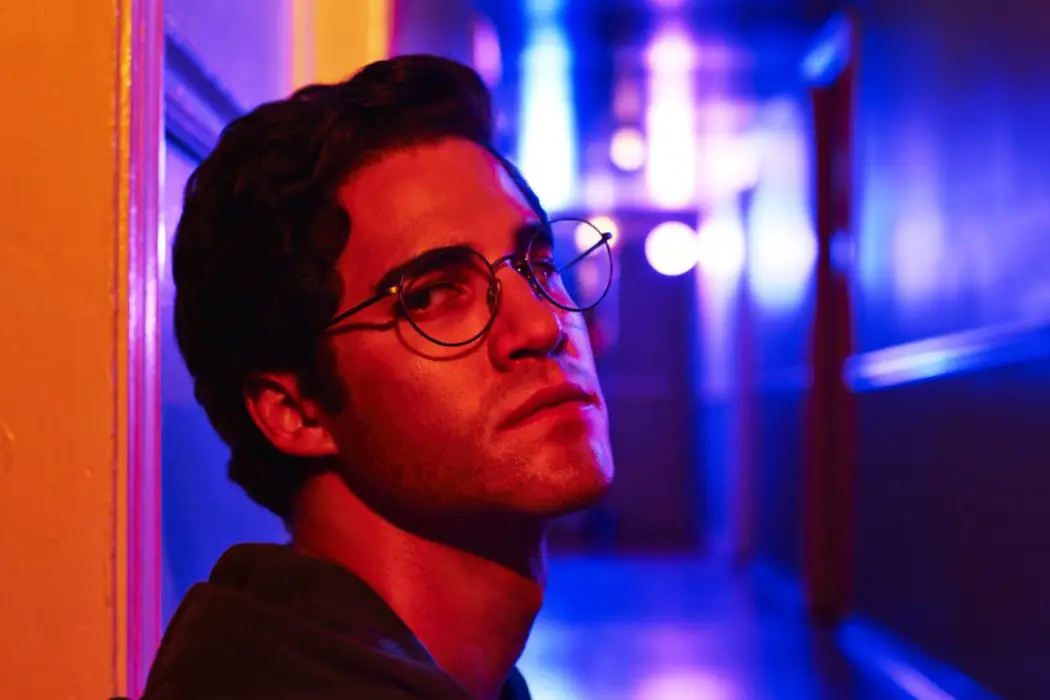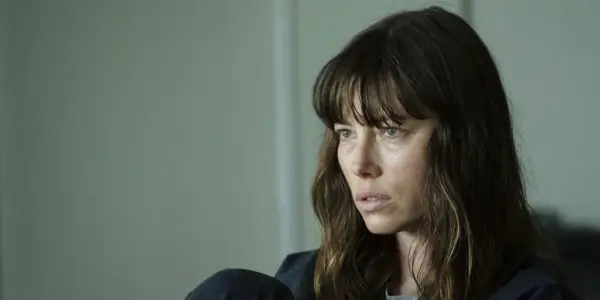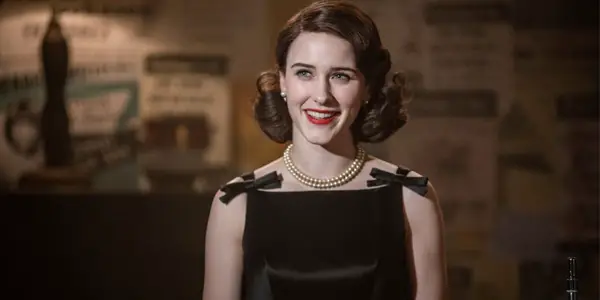Staff Inquiry: Favorite 2018 Emmy Acting Nominees (Comedy & Limited Series)

Nathan decided to take a gap year after completing his…
After revealing our top picks in the Outstanding Lead Actor and Actress in a Drama Series categories for the forthcoming Emmy Awards (17th September, people!), Film Inquiry have rallied to fend for our favourite nominees in the Limited Series/Movie and Comedy Lead Performance categories.
See below who each of us are throwing our support behind and be sure to let us know your pick too!
Kristy Strouse – Jessica Biel, The Sinner

The success of the limited series, The Sinner, was significantly reliant on Jessica Biel‘s performance. For this story to work you had to see the discord within her. You had to watch this mystery unfold and gauge her responses to each new detail. And oh, what a unraveling it was.
This season was about a woman who committed a grisly murder in the middle of a beach, as her family looked on. But why? She didn’t know. Something triggered inside her, because of a past trauma, and that’s the scariest thing of all. The Sinner proved to be an enigmatic entry on television, that I’ll admit – I binged after it aired, making it easy to digest Biel’s portrayal in its entirety (also you didn’t have to wait weeks for answers). With her co-star Bill Pullman equally up to the task, their continuous push and pull provided significant tension as the truth became clear.
For this character to earn our empathy and support she had to be as disturbed as the audience, and she was. As the pieces slowly come together and the puzzle is revealed, Biel had to emotionally ravage herself, baring herself completely. It’s difficult to watch because she does such an incredible job embodying Cora. As she wrestles with her own memories and fears, at a loss, she holds on, fighting through the desire to give up.
There’s something incredibly human about this position, and she doesn’t hold back, or refrain from giving her all into the performance. This isn’t to say Biel hasn’t had roles that worked for her, but this one was perfect. Cora’s position is also brave and important as we begin to understand more of what trauma can do to an individual, and find ways to work through it. It’s not just a powerful, Emmy-worthy take, it’s a statement: we can prevail.
Amanda Mazzillo – Rachel Brosnahan, The Marvelous Mrs. Maisel

When I found out Rachel Brosnahan received an Emmy nomination for Lead Actress in a Comedy Series, my excitement for the ceremony skyrocketed. When I watched The Marvelous Mrs. Maisel, I tried to pace myself, but that flew away. Rachel Brosnahan’s performance as Midge Maisel is simply wonderful. In a show filled with such a wonderful ensemble, all doing amazing work, Brosnahan’s performance manages to stand out, and suck you even further into the show. When Midge goes on stage to do her first impromptu stand-up act, you can’t help but cheer her on, and hope everything works out for her. Brosnahan plays Midge with such energy, and you can easily believe how everyone is so captivated with her.
Rachel Brosnahan deserves this award for her captivating performance, from the cathartic and fast-paced moments on stage, to the quieter moments exploring the depth of her character, especially those exploring her growth as a woman and her friendships and relationships with all those around her.
Midge Maisel is a role-model for all those women who want to break out of the roles they are assigned and follow their heart. Rachel Brosnahan brings the character to life in a picture-perfect performance exploring the roles of women in the 1950s without losing her spark and spunk. Her performance, as well as the performances of everyone else in the show, capture the decade in such a wonderful way, while also telling a story to which modern audiences can absolutely relate.
The Marvelous Mrs. Maisel is a wonderful show, exploring the history of women in comedy while exploring the personal moments of its marvelously written characters. Rachel Brosnahan’s performance as Midge Maisel transports you to another time, while showcasing both her comedic and dramatic talents in an unforgettable show
Nathan Osborne – Darren Criss, The Assassination of Gianni Versace: American Crime Story

Darren Criss surprised the world with his sensational, well-rendered performance as infamous serial killer Andrew Cunanan on FX’s The Assassination of Gianni Versace: American Crime Story earlier this year. As someone mostly recognised for his work on a series as innocuous as Glee, it was a welcome surprise to witness a star being born, sinking his teeth into a far meatier role that has allowed him to demonstrate his true range and versatility as an actor. More so than any other nominee, it felt like a watershed moment for Criss, a career-redefining turn that proved him as an actor worth taking seriously: when he’s delivering a performance as fantastically-observed and detailed as the one showcased here, how could we not?
Throughout all nine episodes of the Ryan Murphy-helmed Assassination of Gianni Versace, Criss so meticulously-measures the brilliantly unsettling Cunanan with a steady poise and composure that he slowly let slip as the narrative deepened and the suspense upended as it drew to its enthralling close. From start to end, he compels with a disconcerting charisma stirred with a psychotically murderous streak that crafts an intricate portrait of Cunanan’s mind and agency: in less assured hands, the whole thing could fall to pieces – but Criss brazenly injects a tinge of sympathy, making it a far more nuanced interpretation. His every move and expression is part of the charade and persona Cunanan cultivated, considered in every instance and so exacting in the execution. Even surrounded by more veteran actors in more attention-grabbing, physically transformative turns, it was always Criss who slipped into the role with the most fascinating ease. If the performance didn’t feel so terrifically, appropriately calculated, I’d be concerned.
Criss impresses, amazes and captivates as Andrew Cunanan, relishing in his most substantial role to date. Emotionally complex and visceral, Darren Criss’ best performance also happens to be one of the year’s very best (in any medium) and he is more than deserving of the award for Outstanding Lead Actor in a Limited Series or Movie he is favoured to pick up on September 17th.
Tomas Trussow – Laura Dern, The Tale

In The Tale, Laura Dern plays the film’s director, Jennifer Fox, who recounts with increasing vividness the sexual abuse she suffered in her teens at the hands of her running coach. Dern’s role is that of memory detective, trying desperately to recollect a trauma she had stowed away in the recesses of her subconscious, having lived her life believing that she had merely found love at an early age. She is defensive at first, and resistant to the idea that she’d been taken advantage of. But as the pieces start clicking into place, defiance gives way to horror and shame.
The formal elements that make The Tale such an engrossing watch, such as the visual way the volatility of memory is shown onscreen, would be enough to make it a success. But without a strong lead, it could also quickly fall apart. It doesn’t because Dern is more than just strong: she’s a powerhouse. She portrays Fox compassionately, to be sure, and finds the littlest ways to make her relatable. Yet there is also a timelessness to the way Fox hunts for the truth that Dern embodies so well. That hunger for the light, and the fight put into seeing it, is all in Dern’s expressions and gestures, so that even when the film’s timeline goes backward into the past, Dern’s presence is still very much felt.
The coup de grâce, and the reason why Dern deserves to win that Emmy, lies in her final few scenes, when she confronts her abuser for the first time since her childhood. The scene is difficult to watch because of how organically Dern plays it, with a mixture of rage and agony that bubbles to the surface in an instant. No longer helpless, she is finally able to face the demon that has haunted her existence, but she also recognizes that the effort will be largely futile. But instead of treating the experience as a crushing defeat, she reclaims the moment as her own act of heroism. No longer a victim, she can finally speak out and exercise the agency that she was denied all those years ago. Dern’s emotional victory becomes ours, and it takes a truly special actress to make it look so easy.
Alistair Ryder – Donald Glover, Atlanta

No other person has left as significant a stamp on pop culture this year as Donald Glover. His surprise Childish Gambino single This is America became the must-see viral video of the year (give or take a Johny Johny Yes Papa), his extended cameo performance as Lando Calrissian became widely beloved even as the film it was part of spectacularly flopped, and most importantly, his FX show Atlanta returned for its second season with more critical adoration than before. Billed by Glover, somewhat disingenuously, as “Twin Peaks with rappers” prior to the first season premiere, the second season’s increased flirtation with horror storytelling has made this original comparison start to hold weight.
Atlanta is a funny, richly detailed and acutely observed series – but in its second season, it became stronger by becoming a succession of self-contained character dramas, breaking from sitcom storytelling conventions that Glover has never particularly shown an interest in (arguably the only comparison with the previous sitcom in which he starred, NBC’s Community). Of the character arcs presented in Robbin’ Season, the fractured relationship between Glover’s Earn and his cousin Alfred (Brian Tyree Henry), is the most involving. Henry, who has picked up his first Emmy nomination for his work this season, has the showier arc, as Alfred to reconcile the new demands of fame as Paperboi with the lifestyle he’s become accustomed to – peaking in the season’s second horror inflected episode, “Woods”.
Glover, meanwhile, is the series’ lead actor in name only; for somebody with such a natural comedic acting talent, his performance in Atlanta is deceptively difficult in how he has to neutralise his instincts to become the sad sack everyman. In Robbin’ Season, Earn frequently disappears for multiple episodes at a time, becoming a side player in his own story (although episodes like “Teddy Perkins” ensure Glover remains an unforgettable presence, even behind layers of prosthetics). This is, of course, by design, illustrating the growing divide between the two cousins at the show’s centre – and Glover’s refreshing lack of megastar egotism ensures that there is no compromise to portraying the incessant failings of Earn’s personal and professional lives.
Atlanta remains a funny show in its second season, but its real triumph is giving deeper focus to the emotional arcs of its characters, even as it constantly experiments with storytelling form and moves further away from anything resembling convention.
Stephanie Archer – Regina King, Seven Seconds

Since the dawn of film and television, a mother’s heart break has been played out through a variety of characters, providing audiences with a source of countless tears. With her portrayal as Latrice Butler in this year’s stunning debut Seven Seconds, Regina King brings depth and complexity to a grieving mother, a character whose showcase and utilization too often has a tendency of being reduced to a poorly developed supporting character. Over a ten episode arch, King utilizes this limited time effectively and efficiently, executing with brilliance not only a grieving mother, but the will and defiance to fight for justice. Her portrayal is heartbreaking, even when she is showing strength in character on screen.
Seven Seconds is a powerhouse limited series from Netflix, effective and unrelenting in its attempt to present every angle of a societal crisis that has happened throughout our country. It is a series that proves the continued importance of the limited mini-series medium, and King’s performance is further proof of the freedom and range it lends to its actors. Limited series are those stories that can not be contained within a 2-hour context of a film, yet would be overkill for viewers within a 22-episode order. It allows for increased tension, a characteristic King incorporates perfectly.
King embraces the heartbreak of a mother, whose son was wrongfully taken from her too soon. Yet, it is not within the loss of a son where King’s performance stands out, it is her foundation. Her character follows an arch, each installment giving King new material and growth – from a mother convinced her son will survive, to losing him; to knowing who her son truly was, and proving it; to seeing an injustice, and fighting against it.
Each of these elements, as well as the characters she interacts with, provides King with a range of emotions and actions, stretching her portrayal and bringing deeper credibility to her character and the series. There are layers of complexity and emotion that further elevates Latrice Butler, preventing the character from falling victim to underdevelopment, and King simultaneously executes each one with perfection. With the introduction of the limited series, and the increased production through streaming services, the amount of television content available to viewers is overwhelming. Yet, throughout all the content that has been introduced and has returned this year, Regina King’s performance has reigned supreme and is one you will not soon forget.
Manon de Reeper – Tracee Ellis Ross, Black-ish

Black-ish is funny, poignant, touching, sweet, enlightening – all that and more. However, it wouldn’t have worked as well as it does if it weren’t for Tracee Ellis Ross.
Ross is the soul of Black-ish; she plays the mother of a family of five kids (six, if you count Dre), all while being a badass surgeon. She’s smart, witty, funny and oh so charismatic, and she knows what to do with the most emotional moments, driving them home like no other actor on the show.
In the latest season, season 4, her character Rainbow and her husband Dre (Anthony Anderson) go through a rough patch in their marriage, and as a child from a broken marriage myself, I appreciated the honesty with which they portrayed their conflict. For a comedy, they made me cry a surprising amount. Not only did Ross portray her character consistently and touching as always, she also directed one of the most significant episodes of the season (“Fifty-Three Percent”).
Many will know Ross as the daughter of legendary Motown singer Diana Ross, however, Tracee has been active in the entertainment industry for years. She is a model, TV host, and before Black-ish, she played in a number of TV movies, and had an 8-year run on a sitcom called Girlfriends in the early 2000s, for which she received two NAACP Image Awards for Outstanding Actress in a Comedy Series.
So far, her work on Black-ish has earned her quite some awards attention, as well – she has won 3 more NAACP Image Awards, a Golden Globe, and has been nominated for a Primetime Emmy award three times including this year, though she has yet to win one. This year is Tracee Ellis Ross’s year at the Emmys. Though I’m keeping a close eye on Issa Rae…
Zoe Crombie – Lily Tomlin, Grace and Frankie

The original premise of Grace and Frankie provided ample opportunity for some decent, if bittersweet comedy. Two couples in their 70s, the husbands end their marriages to get together after a decades long affair, and the rival wives must fend for themselves and befriend each other. This plot gave way to some lukewarm reviews – after all, the central conceit on its own can only carry the series so far. Maybe that’s why the more recent series, which have dedicated themselves to deepening the relationships between characters and tackling some of the social issues that come along with both aging and homosexuality, have received such critical acclaim.
But regardless of this, since the first season premiered on Netflix in 2015, Lily Tomlin’s performance as Frankie Bergstein has been (in my opinion) the strongest element of the show. As the second half of the titular pair, Frankie is a weed-smoking hippy art teacher more concerned with her vibes than anything attached to the real world, as the more serious Grace (played wonderfully by Jane Fonda) frequently reminds her. In the hands of another performer, this archetype could have quickly become irritating or predictable, but Tomlin’s line delivery is so consistently hilarious that you can’t help but love Frankie. Though the writing is often funny by itself, quips like “sweet, muscular Jesus” and “I can’t lube a vagina with one hand and slap an orangutan with the other” are hysterical when said in Frankie’s loudly sincere tone.
Her comedic abilities are one thing, but Tomlin’s dramatic capabilities have been truly tested this season. With Frankie facing relationship issues and health problems, she must confront the realities of her age and mortality to a greater extent, and her relaxed attitude to life is increasingly under threat. Tomlin’s intense likability makes these scenarios all the more heart-breaking, and the childlike warmth she brings to every episode could not be found in any other actress.
Lily Tomlin is deserving of the Emmy for Best Actress in a Comedy Series not just for her fantastic comedic timing and enthusiastic delivery of one liners, but also for lending depth and complexity to a character that could have amounted to so much less.
Which nominee are you hoping to pick up gold on September 17th? Tell us your thoughts in the comments below!
Does content like this matter to you?
Become a Member and support film journalism. Unlock access to all of Film Inquiry`s great articles. Join a community of like-minded readers who are passionate about cinema - get access to our private members Network, give back to independent filmmakers, and more.
Nathan decided to take a gap year after completing his A-Levels (Media Studies, English Language & Literature and Drama & Theatre Studies) to gain some journalism and media experience before making the next step. In that time, he has continued to run his blog - PerksOfBeingNath - which is now approaching its second anniversary and crammed in as many cinema visits as humanly possible. Like a parent choosing their favourite child, he refuses to pick a favourite film but admits that it is currently a tight race between Gone Girl and La La Land. Self-admitted novice on cinema of the past and always open to suggestions. http://perksofbeingnath.blogspot.co.uk













